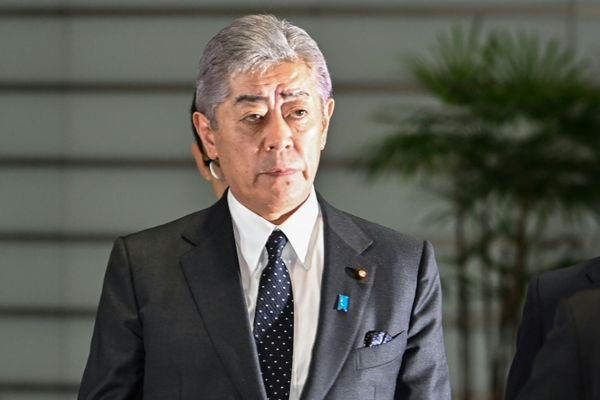
Paris (AFP) - French unions on Wednesday said last-ditch talks with the prime minister to ease tensions over a divisive pension reform were a "failure" and called for record turnout at protest rallies the next day.
President Emmanuel Macron is facing the biggest challenge of his second term over his flagship pension overhaul, which includes hiking the minimum retirement age from 62 to 64.
Unrest erupted after Prime Minister Elisabeth Borne on March 16 invoked a controversial executive order to ram the bill through parliament without a vote despite months of mass protests against it.
Unions had warned ahead of Wednesday's meeting with Borne that they would storm out if she refused to discuss going back on the minimum retirement age of 64.
"It's clearly a failure when the prime minister won't even allow a way in to that discussion," said Cyril Chabanier, speaking on behalf of the country's eight main unions after they walked out barely an hour into the talks.
"We again told the prime minister that the only democratic outcome could be the text's withdrawal.The prime minister replied that she wished to maintain the text," he added.
It was the first such gathering between the two sides since the government presented the contentious pensions bill in January.
Despite refusing to budge on the issue, Borne said she would not move forward with any other labour topics "without social partners".
'Democratic crisis'
The country's Constitutional Council is to give its final say on the pension changes on April 14, the last step before they are signed into law.
"We are experiencing a grave democratic crisis," said Laurent Berger, head of the centrist CFDT union.
"We call on the wisdom of the constitutional council...Our democracy needs appeasement, and this appeasement would be for the text not to be applied," he said.
Macron is on a visit to China for the rest of the week, where an aide denied there was a "democratic crisis" in France despite the failure of Wednesday's meeting.
"You can't speak of a democratic crisis when the bill has been enacted, explained to the public and the government is taking responsibility for it," said the aide, asking not to be named.
Union chiefs called for French people to take to the streets and strike en masse on Thursday, for an 11th day of nationwide action against the bill.
Sophie Binet, the new leader of the CGT trade union, called for more protests and strikes.
"We have to continue mobilising until the end, until the government understands there is no way out other than withdrawing this reform," she said.
"The government will not be able to govern the country until this reform is repealed."
'No to 64'
Activists on Wednesday unfurled a banner at the top of the capital's landmark Arc de Triomphe, reading "No to 64".
The government has argued that the changes are necessary to prevent the pensions system from plunging into deficit.
In the rest of Europe, people mostly retire in their late sixties as life expectancy has increased.
Critics say the pensions reform is unfair for workers in tough jobs who start their careers early, as well as women who interrupt their work life to raise children.
Protests since January have largely been peaceful, but spontaneous rallies since March 16 have sparked clashes between protesters and police.
Rights groups have accused the police of disproportionate use of force in handling the unrest, but the interior minister has said security forces were responding to "far-left" radicals.
A record number of people, more than 1.2 million, marched against the reform nationwide on March 7, according to official figures, but numbers have since largely waned and strike attendance has diminished in recent weeks.
Just 20 percent of schoolteachers are expected to strike on Thursday, the Snuipp-FSU union said.
Paris transport operator RATP said traffic would be more-or-less normal for metros and trains linking the capital to its suburbs.
sl-are-chl-ah/sjw/pvh







